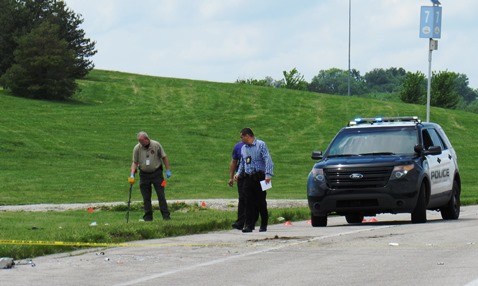
Wyandotte County and Kansas City, Kan., saw some extreme highs and lows for the year 2016.
Here are some of the events that were important in Kansas City, Kan., and Wyandotte County during the past year.

1. Two KCK police officers were killed in 2016 in the line of duty, responding to crime scenes. Tributes were held to honor Detective Brad Lancaster (May 9) and Capt. Robert David Melton (July 19).
https://wyandotteonline.com/kck-detective-shot-near-speedway/
https://wyandotteonline.com/kck-police-captain-dies-in-shooting/
2. Village West bonds were successfully paid off early this year, signaling a victory for officials who dreamed up the idea of The Legends and Village West a decade ago. Meetings in 2015 and 2016 were held on how to spend the windfall sales tax revenues. As a result, property tax rates were reduced slightly this year, and several other projects moved forward.
https://wyandotteonline.com/ug-commission-moves-forward-with-2-mill-property-tax-reduction/

3. The year saw a tragedy for the Schlitterbahn, a water park in Kansas City, Kan., and its ride, Verruckt, the world’s tallest water slide. On Aug. 7, during a Sunday event for the families of government officials, a boy who was the son of a state legislator from Olathe died in an accident on the ride. Later, the water park announced the ride will never run again.
https://wyandotteonline.com/boy-dies-on-schlitterbahn-waterslide/
https://wyandotteonline.com/schlitterbahn-to-remove-fatal-water-slide-in-kck/
4. There are expected to be changes after more GOP moderates were elected to the Kansas Legislature in November. While more Republican moderates won victory in Kansas Legislature, the more conservative candidate of two major parties took the White House in November. Next year there could be a possible state shift in the moderate direction, while a possible federal shift in the conservative direction. Also in the November election, Kansas Supreme Court justices survived a challenge from conservatives.
https://wyandotteonline.com/legislature-inches-toward-center-with-leadership-elections/
https://wyandotteonline.com/chief-justice-explains-role-of-court/

5. After looking for a new home for years, the American Royal announced on Oct. 25 that it was moving from Kansas City, Mo., to an area between 110th to 118th, from State to Parallel Parkway, in Kansas City, Kan.
https://wyandotteonline.com/american-royal-proposes-to-move-to-wyandotte-county/

6. The homicide rate in Kansas City, Kan., and neighboring Kansas City, Mo., was up during 2016. Community forums were held in Kansas City, Kan., on ways to reduce violence.
https://wyandotteonline.com/leaders-plead-with-community-to-stop-violence-and-come-forward-with-information-to-solve-four-homicides/
https://wyandotteonline.com/residents-at-forum-point-to-unemployment-hunger-education-as-factors-in-communitys-crime/
https://wyandotteonline.com/community-forum-continues-on-how-to-reduce-violence-in-kck/

7. Amazon announced it will build a new facility near Turner Diagonal.
https://wyandotteonline.com/more-than-1000-jobs-coming-to-kck-with-new-amazon-distribution-facility/
8. UG implements new program to reduce blight, tear down older properties and transfer delinquent properites.
https://wyandotteonline.com/ug-land-bank-tries-different-tactics-to-expedite-transfer-of-tax-delinquent-property/

9. Indian Springs mall was demolished.
10. Kansas Supreme Court hears arguments in school finance case, whether funding is adequate, with a decision expected sometime during 2017. The Legislature passed a school finance bill in June to satisfy an earlier court decision on whether funding was equitable. Its decision in 2017 could affect the state’s financial condition.
https://wyandotteonline.com/oral-arguments-heard-in-school-finance-case/
https://wyandotteonline.com/kansas-supreme-court-accepts-school-finance-law-says-it-satisfies-court-order/
Among the notable leaders in the community who died during 2016 were Gloria Willis, long-time member of the Kansas City, Kan., Board of Education; Ray Byers, a Kansas City, Kan., architect; and Mary Ann Flunder, a long-time member of the Kansas City Kansas Community College Board of Trustees.
https://wyandotteonline.com/long-time-kck-school-board-member-gloria-willis-dies/
https://wyandotteonline.com/opinion-column-architect-left-much-to-community/
https://wyandotteonline.com/mary-ann-flunder-long-time-kckcc-board-of-trustees-member-and-mentor-to-many-dies/

